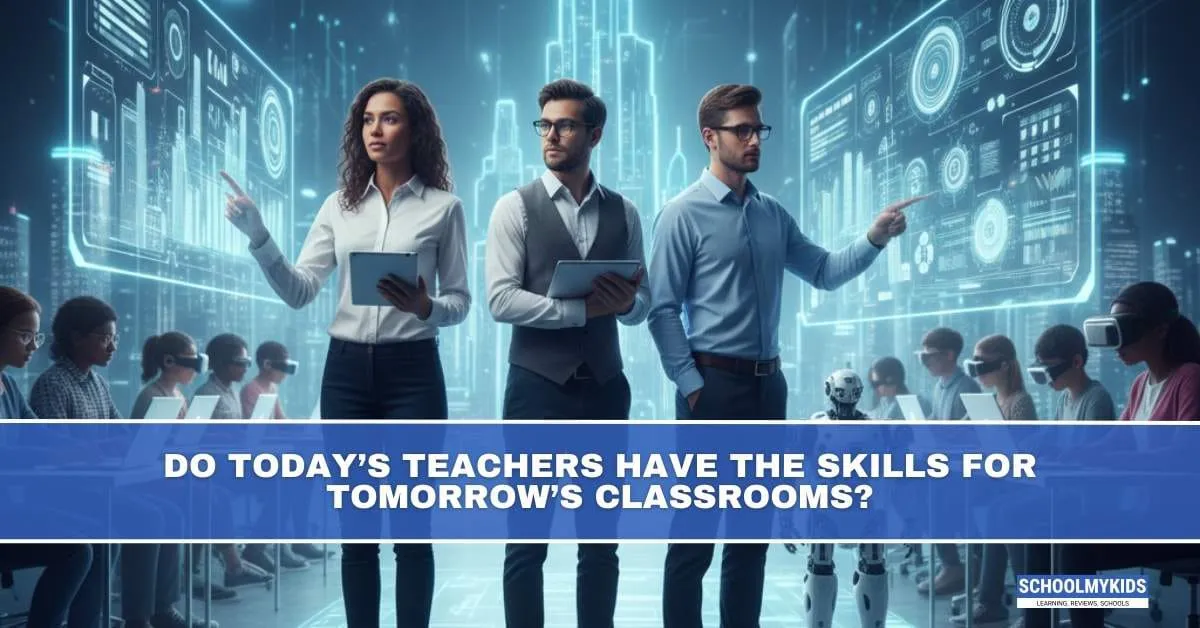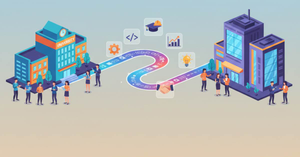Imagine a classroom in 2030. Students wearing smart glasses. Teachers using AI tools to generate personalised lesson plans. Virtual reality labs replacing traditional blackboards. Now pause. Are our teachers ready for that world?
This is not science fiction anymore. The pace of change in education is faster than ever, and teachers, who are the heart of learning, are standing at a crossroads. Do today’s teachers have the skills for tomorrow’s classrooms? Let’s try to find out.
The Changing Face of Classrooms
Just in the last decade, we’ve gone from chalk-and-talk to smart boards, from note dictation to Google Classroom, and from tuitions to online teaching. The pandemic accelerated this shift even more, and suddenly, every teacher had to become tech-savvy overnight.
Tomorrow’s classrooms will look even more different as blended learning, AI tutors, project-based learning, emotional literacy, and global collaborations will be the new normal. Education is no longer about textbooks and exams; it’s now about thinking, adapting, and creating.
But this transformation has also exposed a big gap between the old skill sets teachers were trained with and the new realities they face.
The Old Skills Still Matter
Before we rush to conclusions, let’s acknowledge something: many of the best teacher qualities never go out of date. Patience, empathy, communication, classroom management, and the ability to connect with students are timeless.
A teacher who truly cares for students, listens to them, and helps them grow as human beings will always be valuable, no matter how futuristic our classrooms become. Technology may assist learning, but it can never replace emotional connection.
So yes, the heart of teaching remains the same. But the “hands” that deliver it are changing.
The New Skills Teachers Need Now
The teachers of tomorrow need a broader toolkit that balances old wisdom with new-age skills. Here’s what tomorrow’s classrooms are already demanding:
- Tech Confidence, Not Just Tech Literacy: Teachers no longer need to be coding experts, but they must be comfortable with digital tools, from using AI-based lesson planners to managing hybrid classrooms. Tools like Google Classroom, Kahoot!, and Canva for Education are becoming as basic as chalk once was.
- Data Understanding: Tomorrow’s classrooms rely on learning analytics like attendance patterns, quiz insights, and progress tracking. Teachers must learn to interpret these numbers to support students better.
- Flexibility and Creativity: The syllabus may be fixed, but the teaching methods can’t be. Project work, storytelling, and gamified lessons; teachers now need to experiment constantly to keep students engaged.
- Social-Emotional Awareness: With rising mental health concerns among students, emotional intelligence is as essential as subject knowledge. Teachers must know how to identify stress, burnout, or bullying early.
- Global Mindset: The world is interconnected. Teachers need cultural awareness, digital ethics, and the ability to connect local learning to global contexts.
The Indian Reality Check
In India, we have millions of passionate teachers doing their best with what they have, but also a system that sometimes fails to keep up. Many schools, especially government and rural ones, still lack basic digital infrastructure. Teacher training programs often remain outdated, focusing more on theory than on practical skills.
But there’s hope. The National Education Policy (NEP) 2020 recognises this gap and talks about continuous professional development, reducing rote learning, and promoting technology integration. Several state governments and private schools have started offering tech workshops and online training for teachers. The shift has begun, just not evenly.
Are Today’s Teachers Truly Ready?
The honest answer: Some are, and some are getting there.
The teachers who are curious, who keep learning new things, and who can balance empathy with experiments will thrive in tomorrow’s world. The rest will need structured support through better training, mentorship, and recognition.
Being a teacher today means being a lifelong learner. The best teachers are not the ones who know it all but the ones who never stop evolving.
Conclusion
Parents, schools, and policymakers need to work with teachers, not just expect them to adapt alone. Teachers deserve time, tools, and trust to grow into their new roles.
Tomorrow’s classrooms are not meant to replace teachers; they’re meant to empower them. The human element will always matter most.
So, do today’s teachers have the skills for tomorrow’s classrooms? Not all of them, yet. But with the right support, training, and mindset, they absolutely can.








Be the first one to comment on this story.